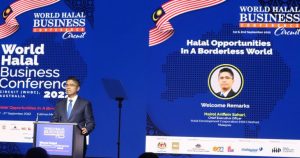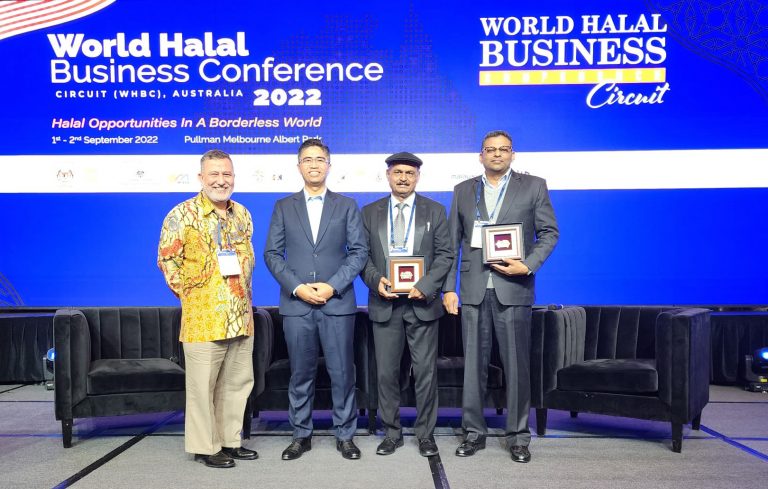[Islamic media content focusing on Islamic culture, values and lifestyle has grown exponentially in today’s borderless and digital world. The business model is seeing a shift from high-budget production houses to the emergence of independent content using interactive online digital technology]
The role of Journalists, writers, intellectuals, Islamic leaders, entrepreneurs, and industrialists is becoming increasingly important in this competitive world.
Globally, there are 8 billion people, of which 2 billion are Muslims. 57 Muslim countries exist, each with its own history, culture, languages, food, and way of life. Yet, they all share ONE common belief and Islamic history.
The introduction of computer technology and electronic communication led to the development of business technology. Through incredible inventions in science, communication, and digital technology, humans have transformed this world with modern tools of marketing, media, and entertainment.
We see the people of this world technologically in Generations though it has only been 70 years.
After the baby boomers (early 1960s to late 1970s), the generation typically seems aimless. They are known as GEN X.
Then came the generation born in the 1980s and 1990s, composed primarily of children of baby boomers, who were perceived as more familiar with digital technology. They are known as Generation Y.
After millennials, we enter the modern period of revolutionary change in digital technology – Generation Z. This refers to people born between 1997 and 2012. Internet, digital networking, websites, mobile phones, and satellite TV have been a part of the lives of this generation.
GEN Z is now followed by Generation Alpha, which is the new generation in their 20s. The digital world is at their fingertips with the help of mobile phones. In spite of some regulatory watchdogs, they have access to all types of halal and haram information and materials. In addition to the ability to view and purchase any material or product online, they have access to all kinds of materials regardless of their age, gender, or religious beliefs (halal or haram).
For Muslims, this generation of Muslims is known as GEN M.
In today’s digital online world, Islamic media content focusing on Islamic culture, values, lifestyle, entertainment, and kids’ content has grown exponentially. Independent content creators are emerging as the business model shifts from high-budget production houses to online
platforms – websites, YouTube, Facebook, and Instagram.
Since these products are easily available to view and purchase on the Internet in this borderless and fast-growing interactive online technology-based business, our GEN M is not protected from haram or prohibited items.
In addition to food products, halal medicine, educational materials, fashion, cosmetics, perfume, and other daily-use consumables, lifestyle products and Travel are available on various online sites. Prior to being displayed for trading, have these products and materials been certified halal by an Islamic halal regulatory authority?
This is a million-dollar question for the Islamic Ummah today.
Among the GEN M, there is confusion over whether to celebrate mother’s day, father’s day, valentine’s day, Halloween day, and other European cultural days as Islamic or non-Islamic.
There are also growing activities among GEN M, especially in western societies, such as the women’s fashion parade and Islamic beauty contest.
Some strict Islamic countries prohibit girls from participating in sports. While some Islamic countries are promoting European, American, and Indian musical concerts under the guise of modernization, others are not.
GEN M is attracted to online Islamic products offered by large companies, but the authenticity of their Islamic products is still debated.
A variety of Islamic products are sold online by American, European, and Chinese international companies, including Prayer Matt, Islamic caps, bandanas, and turbans, Islamic clothing, abayas, turbans, scarves, burqas, hijabs, jewellery for women, cosmetics, perfumes, kids’ games, Islamic books, and CDs. For example.
Craft supplies and handmade items are the focus of Etsy, Inc., an American e-commerce company. These items include jewellery, bags, clothing, home décor and furniture, toys, art, craft supplies, and tools.
Alibaba is a Chinese multinational technology company specializing in e-commerce, retail, the Internet, and technology. This company offers all sorts of Islamic products, lifestyle items, and Islamic books.
Modanisa offers women’s Islamic clothing, dresses, and accessories online. It offers clothing and accessories for women of all ages and offers worldwide shipping and delivery.
The Ummah needs to be made aware of this issue. Globally, extensive educational and awareness activities, such as conferences, seminars, and workshops, are needed.
Through the media industry’s revolutionary changes, Muslim journalists and academics can make a difference on critical issues and sensitive matters. To raise awareness about non-halal products being sold online, Muslim journalists and media should work closely with Islamic scholars and religious leaders. Muslim journalists and scholars must serve as watchdogs over online sites run by non-Muslims posing as Muslims.
In this regard, I must mention here that I find Halal Development Corporation (HDC) Malaysia is delivering excellent services to the halal industry. HDC offers a Halal Integrated Platform (HIP). The organisation offers Halal training workshops, seminars, conferences, and halal consultancy services. Beyond Malaysia, HDC is targeting the halal industry globally.
Mr. Hairol Ariffein Sahari, the Chief Executive Officer, is a visionary in the context of the global growth of Halal. By organizing academic and informative events, his team promotes and creates awareness about the halal way of life, products, and services globally.
On September 1st and 2nd (2022), HDC organized the 2-Day ‘World Halal Business Conference (WHBC)’ in Melbourne. The global Halal fraternity viewed it as the exclusive platform for pioneering Halal thought leadership and knowledge of the Halal economy.

Welcome remarks by Mr. Hairol Ariffein Sahari, CEO, HDC
It is very vital to acknowledge that the business model is shifting away from high-budget production houses to small business operators and homemade products. Digital technology, such as websites, YouTube, Instagram, Facebook, and Tik Tok, is freely used by these traders to market their products. Hence, more work is required to bring other international Islamic bodies, governments, Islamic scholars of varying schools of thought, Imams & muftis, Islamic researchers, and Islamic journalists and media production houses together to agree on an international Islamic halal certification organization for all types of halal products with unanimous agreement. More work is required to bring different international Islamic bodies, governments, Islamic scholars of various schools of thought, Imams & muftis, Islamic researchers, manufacturers, and multinational business stakeholders under one roof to agree on an international Islamic halal certification organization for all types of halal products with unanimous consent.
GEN M is our key asset today for carrying and promoting Islamic practices, halal businesses, and halal living for future generations.
The GEN M is western-educated and equally adept at using modern technology. The Muslim generation is highly competitive, confident, challenging, and remarkably successful in all professions, which is fantastic. Keeping their Islamic obligations and ensuring that they are not doing anything non-Islamic is the big question for them now. In the context of emerging challenges, this raises questions about the future of Islam.
Through knowledge of Islamic history, sharia, and Islamic practice, one will be able to maintain Islamic values and halal lifestyles proudly in their professions and businesses. Today, we see young Muslim girls working in tourism, hospitality, research, and business to preserve their Islamic values. This must continue in the future. In this regard, the role of seniors, Islamic leaders, and intellectuals is more challenging in forming a system of cohesion to continuously provide guidance and true knowledge of halal and haram to young people.
(The author is a Sydney-based journalist, writer, editor-in-chief, Tribune International (Australia), and founding executive director of Halal Expo Australia. He was one of the panellists of a session World Halal Business Conference, Melbourne)


